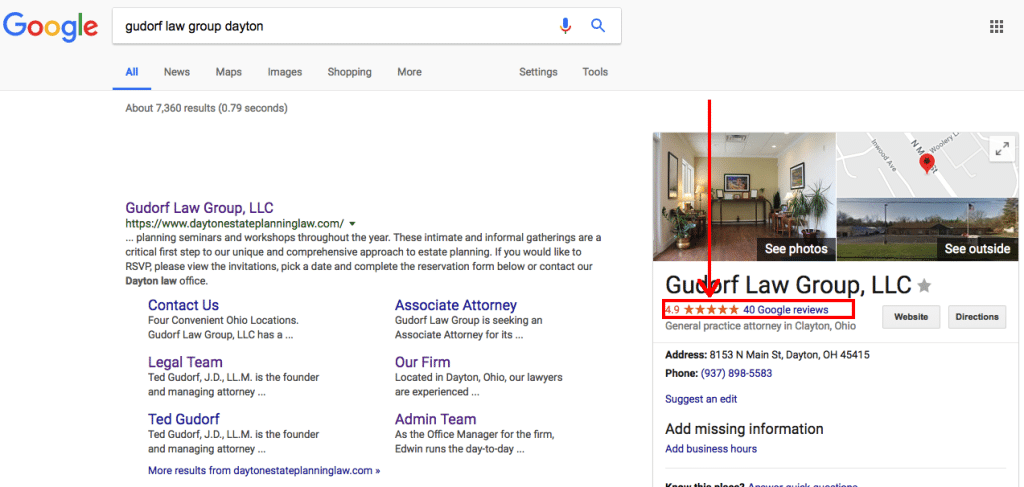Menu
January 4th, 2018
Answer 6 Straightforward Questions So Your Site Doesn't Let You Down in the New Year
Hard to imagine, but 2018 is already upon us! Just like us, I'm sure you've kept up with all of the resolutions you set about a year ago (right?). On to resolutions for 2018!

So how to avoid stagnancy although managing a website can feel like a full-time endeavor? Think of it like getting in shape: it takes a lot of effort to get started, and you have to continue to work at it, but the results are worth it. By using the list of questions below, you can plan your marketing efforts and budget so they more resemble a well-executed game plan than an all-night law school cram.
When is the last time you updated your on-page SEO?
SEO has two main components: on-page and off-page. On-page are things you can directly control by editing your site's structure and content, and off-page are factors originating somewhere other than your site, including other sites, social media posts, and in the news.
After the effort it takes to launch your site, it may seem like you should be able to set it and forget it.
But, between your competitors constantly working on their sites and changes with Google, you have to consider your site a living document that should be updated and changed with the landscape.
Consider this: before December 1st, Google suggested that the meta descriptions on your site be 160 characters long. A meta description tells Google what a particular page is about, and is useful to searchers to give them a sense of what they can expect on your page.
Then with one update, Google moved to an expanded meta description result, growing the characters from 160 to 230+! This means that those who are staying on top of their SEO are claiming another 30% of the search results page to encourage potential customers.
To stay on top of it all, there are a few main factors you will want to consider for each page, all based around a main keyword that you are trying to rank for:
- Title tag or "browser title"
- SEO-friendly URL structure (i.e. use descriptive words without excess in URLs like themodernfirm.com/portfolio, not gobbledygook like themodernfirm.com/2012-12-23/port.apsx)
- Header tags (H1, H2...)
- Optimized images
- A great introductory paragraph with your keyword featured
- A well-optimized meta description
- Use of links to other sites and the other pages on your site
For a run-down of how to make the most of each of these factors, see: Quick Tips: Better SEO for Your Blog
Depending on how old your current site is, you may also want to check some bigger issues surrounding the structure of your site, such as mobile-responsiveness. You can check your site here: Google's Mobile-Responsive Test. Mobile-responsiveness and SSL security are based on the technological structure of your site, and are important search engine ranking factors that will continue to grow in weight.
Google is in a constant fight against spammers, and always looking for ways to keep their users happy. These continual changes mean that if you haven't worked on the your on-page SEO for 2+ years, you are missing opportunities for free traffic and additional cases.
When is the last time you updated your blog?
"Content is king" and, like most boring clichés, this phrase has an excellent lesson lying within.
The job of a search engine such as Google is to give its users an excellent search experience so they will continue to use the service (and hopefully click on ads some of the time). To do this, Google has to consider the thousands of factors that make a website the exact right answer for any given search entry. And, considering that approximately 15% of searches each day have NEVER been entered into Google before, Google has to do this on its feet, in a dynamic fashion.
Let's consider Site A and Site B. Both were set up well using best practices and included about 25 pages of content at the time of launch. However, after launch, Law Firm A committed to a content plan and continued to expand the scope of Site A with relevant articles, while Law Firm B got busy with legal work (being busy is technically a good thing — but potentially a temporary one if marketing efforts slack as a result) and left Site B as-is. Not only will Site A have additional opportunities to rank in Google search results based on the keywords from these articles, but Google will notice that an active approach is being taken with the site — and will reward it with higher rankings.
Blogging is probably the #1 marketing tactic we hear attorneys say they will handle themselves that never happens. It easily drops down the to-do list because it isn't something you see an immediate return on. However, blogging — or something like it — is an important part of the ecosystem of your site and can bring you in clients for years to come.
When is the last time you updated your attorney bio?
Besides the homepage, attorney biographies are likely the most visited pages on your website. Buying legal services can be a difficult proposition: prices are variable and the "product" is often something a person doesn't want to deal with in the first place. On top of it all, there is so much noise out in the world that potential customers can lose the message. Since so often lawyers are offering the same benefits (free consultations, flexible fee structures, etc.), a big factor is whether or not the prospective attorney is someone a customer can relate to and thinks will be easy to get along with.
Your attorney biography is arguably the most important sales closer on your site. We see this traffic pattern often:
Google Search → Practice Area Page → Attorney Bio → Contact Form
Hiring an attorney is a major life event in many cases, and your attorney bio page lets clients know why they should trust you above everyone else. And very few websites update their bio pages even though these page are so highly visited.
Consider the following:
- What are you trying to say with your biography? Does the tone match with the personality or tone you bring to your practice areas?
- What has changed since the last time you updated this page? Have you had any major case successes, become a part of any groups, or had any life events happen recently?
- Is there anything important you didn't highlight the first time around that would be of use to potential clients now?
When is the last time you made sure your business information was correct around the Internet?
In order to establish local rankings, Google uses consistency and frequency of your business information — such as name, street address and phone number — as a major factor (about 13%).
Manually ensuring this information is accurate and up-to-date on the many directory sites throughout the Internet can be a tremendous pain. Since so few people actually claim and maintain their listings, directory sites purchase, scrape and guess at your business information in order to keep their sites full of listings for users. This means that there are usually mistakes or missing listings for your business if you aren't actively managing them.
Try this test: go to our our Location Optimization tool here and enter your business information — it only takes 15 seconds.
.
..
...
..
.
What was your number? We often see new clients in the 80-100% error rate, which makes sense — without active management these listings tend to get sloppy.
This is doubly so if you've made any change to your firm's information, well, ever. If you've moved, changed phone numbers, or updated your firm name, it's almost guaranteed that there is bad business information on your firm online. Not only are you failing to get the full ranking credit you deserve from Google, but it's possible that people are using your old information and you are missing out on leads.
With our Location Optimization tool, you can manually claim and edit all of your listings (make sure the information matches your website exactly). Our attorney marketing options also include perfecting these listings as part of our local marketing Fundamentals. Fundamentals are our most popular marketing option for a reason:
- Manually claiming and managing your listings can takes hours upon hours upon hours of work.
- It's very low cost, high return. With attorney marketing costs so high, Fundamentals brings a return that can't be matched.
When was the last time you got a review?
Now that your business information has been cleaned and is being actively maintained, the next step is generating positive reviews for your law firm. Review signals make up another 13% of your local listing ranking, meaning that the business information and reviews make up over a quarter of your ability to rank highly in your market.
Reviews work on a few levels. Beyond directly impacting your rankings, they are highly sought after because of their ability to offer social signals to potential clients.
As we discussed in the above section on attorney biographies, clients often need tiebreakers in order to make their final decision and select an attorney. When all else is equal, Google, Avvo, and other directory sites make it easy for clients to see reviews that other people have left about the services you offer. While it's easy to dismiss reviews as a "Restaurant on Yelp" problem and difficult to obtain them in the first place, they are an essential part of local marketing and low-hanging fruit for small law firms in an expensive and competitive industry.
Run this test:
1. Open Google.com
2. Type in your business name to see your Google listing on the right side. (You may have to enter your city or additional information to see your exact result, but it should look like this)
3. Note how many reviews you have.
If you are under 10 reviews, it's worth it to create a process within your office that assists and encourages former clients to leave reviews, in order to ensure that other potential clients can see the great work you're doing.
You may find a surprise or two waiting there — oftentimes more negative than positive. If that is the case, than you certainly want to fill your listing up with more positive reviews.
Useful posts: How to Solicit Testimonials or Reviews & How Should an Attorney Handle Negative Online Reviews?
When was the last time you got a link pointing to your site?
Google's original, and possibly most important, ranking factor is links pointing from other sites to your own domain. A link pointing at your site is like a vote in favor of your authority in your field, and has widespread weight across all of your organic rankings. Gathering links can increase both your Local / Map rankings as well as your organic article listings.
Link building can take tremendous effort and you want to be extremely careful with how you proceed. Search engines want to see a natural link profile — i.e., other relevant sites linking to your content because it makes sense for them to do so. Allowing black-hat (against the rules) tacticians to build links for you can permanently damage your domain, meaning you have to start over with your entire site.
However, don't be scared into not considering links with your content and marketing plan. They are an essential part of your rankings and should be treated as an important part of your business.
There are two easy ways to check the links pointing at your site:
- Log into webmaster.google.com with your Analytics account (reach out to support@themodernfirm.com if you are a Modern Firm client and do not have this information).
- Select your website from the list in the middle.
- On the left Menu select Search Traffic and then Links to Your Site.
There are also tools that scrape the Internet to find links, and can offer important opportunities by discovering your competitor's links as well. One of our favorites is Moz's Open Site Explorer, which allows for unlimited searches once you register for free.
We're Here To Help
The Modern Firm has planned, implemented, executed, synergized — whatever business jargon is going to be popular in 2018 legal marketing — all of the above and more for our clients. We know how difficult it can be for a solo or small law firm to handle all of the tasks of a lawyer and business owner and do all of the above.
We can help. With well-defined plans, reporting, call tracking and more, we are here to assist you with any part of the above. Reach out to us here to schedule a marketing call and ask any questions you may have.
More than anything, we hope you have a Happy New Year and are looking forward to working with you in 2018!








